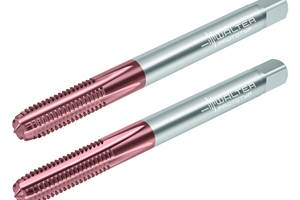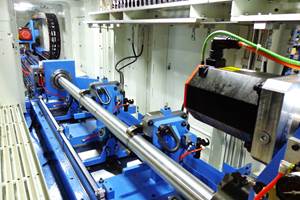Triple Tap Life
A maker of vehicle components finds that a treatment process for taps produces dramatically longer tool life.
Share







Hwacheon Machinery America, Inc.
Featured Content
View More
The Team Industries production facility in Audubon, Minnesota, recently tripled the tool life for taps it uses to machine a cast iron hydraulic motor housing. Team is a manufacturer of chassis and power-train components for off-road and utility vehicles. With 11 tapped holes and an annual volume of 350,000 units, this one part number accounts for nearly 4 million tapped holes per year. The improvement in tap life is—therefore—very significant.
That improvement also directly determines how much the company pays to achieve it. The Team Industries plant sends the taps out for treatment in a third-party process. That process is priced at 40 percent of the customer’s resulting savings in tap expenditures, whatever those savings prove to be.
Better Than New is the Chattanooga, Tennessee company that provides this treatment. The treatment process is called “RF85,” after an Oak Ridge National Laboratory test that documented an 85-percent reduction in friction. Although the treatment had been applied to surgical hand tools and to race-car components, it had seen little application in machining prior to Team Industries. Mike Selck, engineering manager for Team, learned about the process because of an accidental connection to Better Than New’s founder, and he decided to submit some 5/16–24 taps for treatment.
“When I got the tools back, I had to call to make sure the work had been done,” he says. The treatment does nothing to change the tool’s appearance.
But it does change the composition of the tool’s surface. In this way, it also changes the tool’s performance.
Taps at Team Industries that once lasted for 900 parts began to last for 2,700 parts. As a result, the RF85 tap treatment has now been made a standard part of the motor housing part’s production, and it will eventually be standard for other part numbers that Team also machines. Mr. Selck says the savings in tap expenditures are not even the only major source of savings. In his plant’s process, the treatment comes close to paying for itself just in the greater in-cut time that results from not having to change the taps so often.
Not For Carbide
The details of the RF85 treatment are confidential, but Better Than New describes it as a bath that encourages the addition of calcium, among other elements, to the alloy of the tool. The treatment is not a coating. Indeed, the actual coating on the tool, such as the TiAlN on the taps sent by Team, is unaffected.
The company says the treatment does not work well on carbide. It works much better for steel. Further, because the treatment is a friction-reduction enhancement, it delivers the greatest value in applications that are high in friction. For these reasons together, the ideal machining application seems to be tapping—which is a high-friction process that uses HSS tools extensively. Tapping has been the focus of essentially all of Better Than New’s attention to machining so far.
For many shops, that alone is plenty. Tapping can be trying. At Team Industries, tapping has been the operation that most slows down machining, and taps are the tools that typically have to be replaced most often. Giving a try to a previously unknown surface treatment process was not difficult for Mr. Selck, because he had seen the plant try seemingly every other established solution in search of more affordable thread machining. The taps the plant currently buys—the ones it sends to Better Than New—represent the best value the shop has found after evaluating the relative price and performance of many different taps. Now, the plant is able to buy fewer of these taps, paying 40 cents on the dollar instead.
Speed Needed
Mr. Selck says he has noticed that speed is significant. The treated taps are used on three VMCs and one HMC, and tool life has improved three-fold on all four machines. However, there is also a spillover tapping machine in the facility—a manual multi-spindle drill press with much lower spindle speed. When the treated tools are used on this machine, tap life does not show as much improvement. Plant personnel assume the spindle speed difference explains why.
Accordingly, since speed has this influence on performance, Mr. Selck hopes to turn up the speed on the four machining centers’ tapping operations. That speed increase will come next, he says—the shop will measure how much tool life it can obtain at more aggressive tapping conditions.
In addition, the plant plans to apply the treated taps to other machined parts. One of these, a new part number coming from the same customer that receives the motor housings, is particularly promising—because this part is likely to feature just as many tapped holes as the motor housings have.
Related Content
Walter Offers New Solid-Carbide Taps for Blind-Hole Machining
Walter’s TC388 Supreme and TC389 Supreme feature patent-pending cutting geometries that fully shear off the root of the chip when reversing, thus minimizing torque peaks.
Read MoreKennametal Expands Modular Drilling Platform
The KenTip FS GTP insert allows for multiple machining applications across materials including steel, stainless steel and cast iron.
Read MoreCeratizit Product Update Enhances Cutting Tool Solutions
The company has updated its MaxiMill 273-08 face mill, WPC – Change Drill, as well as the HyPower Rough and HyPower Access 4.5-degree hydraulic chucks.
Read MoreKay Engineering's Gundrilling Machine Performs Range of Operations
Kay Engineering’s DeHoff 20144 is used to perform gundrilling, pull boring, roller burnishing and thread tapping.
Read MoreRead Next
Building Out a Foundation for Student Machinists
Autodesk and Haas have teamed up to produce an introductory course for students that covers the basics of CAD, CAM and CNC while providing them with a portfolio part.
Read MoreRegistration Now Open for the Precision Machining Technology Show (PMTS) 2025
The precision machining industry’s premier event returns to Cleveland, OH, April 1-3.
Read More5 Rules of Thumb for Buying CNC Machine Tools
Use these tips to carefully plan your machine tool purchases and to avoid regretting your decision later.
Read More






























.png;maxWidth=300;quality=90)










.jpg;maxWidth=300;quality=90)







